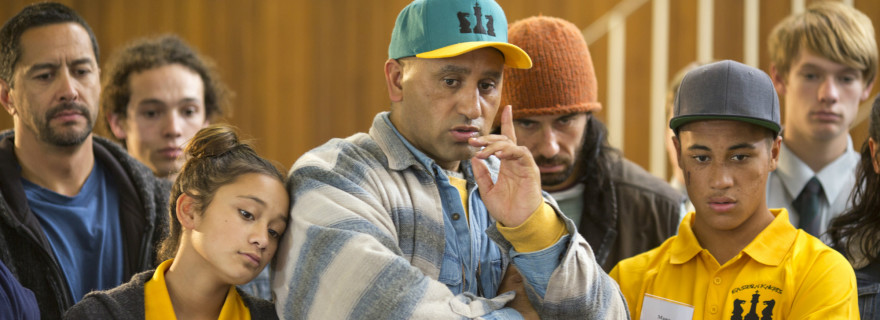'The Dark Horse'
Movie Rating:
3.5
The beauty of a film like ‘The Dark Horse’ is that it gives uplifting dramas a good name. Broken down to the most basic plot elements, the movie sounds like manipulative cheese. It’s about a mentally ill chess prodigy in the midst of family drama who gets caught between a world of gang violence and coaching a chess team comprised of underprivileged youths. Any individual one of those strands could have easily slipped away into the predictable world of easy melodrama.
Somehow, writer/director James Napier Robertson avoids those easy trappings to deliver something moving and inspiring that still unfolds with the messiness of real life. It’s a trick far more difficult to pull off than it seems, and the movie is worth seeking out for all the ways it avoids the usual clichés of these sorts of stories.
An almost unrecognizable Cliff Curtis stars as Genesis Potini, a speed chess genius who opens the film wandering off the street into a store to examine a chess set and quickly finds himself dragged off to a mental institution. After being released, he moves in with his brother Ariki (Wayne Hapi), a longtime gang member who’s trying to pass his illegal trade onto his son Mana (James Rolleston). It’s never entirely clear what the gang does, but it’s clear that they get up to no good and have fairly frightening initiation rituals even though they wear cute matching jackets.
Given Genesis’ recent past, he’s not exactly an ideal candidate to be a role model for the teen, but he’s a better option than the kid’s father. He reaches out to a rundown local kids’ chess club called the Eastern Knights and volunteers to become their coach, convinced that he can get them into a big tournament that’s just a few weeks away. The gig works wonders for focusing Genesis’ troubled mind, even if it doesn’t exactly cool off his home life or frankly even help him retain a home at all. In theory, all signs point to a big, rousing, inspirational finale that’ll bring everyone together and solve gang violence in New Zealand through good old-fashioned gamesmanship. Thankfully, Robertson is too wise and insightful as a storyteller to pull his movie toward an ending so obvious and unsatisfyingly cornball.
First and foremost, the star attraction in ‘The Dark Horse’ is Cliff Curtis, a part-Maori character actor who has played everything from Pablo Escobar in ‘Blow’, to a troubled Iraqi in ‘Three Kings’, and recently Jesus in ‘Risen’. Sure, it’s one of those cases where Hollywood tosses a dark-skinned actor into every conceivable ethnic role, but he’s at least talented enough to rise above that nonsense every time. [Ed.: He’s also currently one of the leads in ‘Fear the Walking Dead’ on cable. –JZ] Curtis is almost unrecognizable at first as Genesis. Larger than normal, missing his front teeth, and mumbling without the type of poise or obvious intelligence that he typically brings to his work, the actor completely disappears into his unique character. Though the role is defined by mental illness, Curtis never leans too heavily into ticks or plays too broadly. He lets the moments where his illness takes over sneak up and gain control without reason, while the times when he’s enlivened and emboldened by his chess obsession feel truly inspiring, rather than some sort of overblown Yoda shtick. It’s a beautifully measured performance from a talented actor that always helps keep the film fresh and full of life.
Undoubtedly, it helps that Curtis had a 2011 documentary (which shares a name with this fictional retelling) about the real Genesis to refer to as reference, but despite that, the underappreciated actor very much makes the role his own in a manner that may well earn him awards attention later this year if ‘The Dark Horse’ isn’t overshadowed by the finds of 2016’s film festival season.
Beyond Curtis, the rest of the cast (young and old) are impressively naturalistic and Robertson weaves together his various plot strands well. The gang story provides threat without cartoonish exaggeration. The family drama provides a moving battle between brothers for the soul of a teen without feeling nearly as soap opera-ish as that sounds. The chess plot provides drama and an easy climatic location without ever fully descending into sports movie silliness. Robertson wisely leans into these various elements for drama and structure, but always slides away whenever predictable dramatic forms emerge. (Even if you might be able to guess how the tournament will play out, it’s nice when the story doesn’t end there or on an obvious note.) It’s a delicate balancing act that the filmmaker pulls off with ease, hinged by a remarkable central performance and shot to provide a glowing beauty to the rundown and regionally specific locations.
True, few of the chess kids or gang members beyond the central characters are well developed or particularly well-defined (especially the overly evil gang leader), but they at least feel like actual humans in their limited screen time. ‘The Dark Horse’ is a very sweet and moving little story that draws focus to the often-troubled lives of the native Maori population of New Zealand and presents them with warmth and honesty. The film is better than any potential tagline might suggest and will hopefully find an audience outside of New Zealand. Often, the most regionally specific and personal stories also paradoxically prove to be the most universally appealing.




C.C.
-“almost unrecognizable Cliff Curtis” LOL!
Yeah, since no one knows who the hell Cliff Curtis is – he IS gonna be pretty unrecognizable!